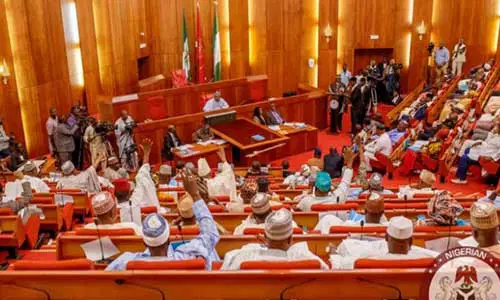
•You’ll kill tertiary education with your proposal on TETFund, ASUU tells FG
•SERAP tasks NASS to assess human rights impacts
THE 10-man committee constituted by the Senate will on tomorrow meet with the Attorney General of the Federation and Minister of Justice, Lateef Fagbemi, to brain storm on the tax reform bill forwarded to the National Assembly for consideration and subsequent approval.
A member of the committee who spoke with Vanguard yesterday, said before the meeting with the AGF, there would be a meeting of the members today.
According to member, the bills will be thoroughly look at to x-ray some grey areas contained in it, then pass it at the end of the day.
Recall that the Senate had last Wednesday, set up a 10-committee to meet with the Attorney General of the Federation.
The membership was drawn from the six geopolitical zones of the country, including Senate Minority Leader, Abbah Moro, PDP, Benue South representing the North Central is the Chairman of the Committee that will liaise with the Attorney-General and Minister of Justice to eliminate the contentious clauses in the tax bills.
Other members of the committee are all the leadership of the Senate including, Adamu Ailero (PDP, Kebbi Central for North West; Orji Kalu, APC, Abia North for South East; Seriake Dickson, PDP, Bayelsa West representing South South; Titus Zam (Benue South), Abdullahi Yahaya (Kebbi), Adeola Olamilekan (APC, Ogun West), Sani Musa (APC, Niger East) and Adetokunbo Abiru (APC, Lagos East)
Reacting to the issue yesterday, the Academic Staff Union of Universities, ASUU, said the Federal Government would kill public tertiary institutions and education in the country with its proposal to phase out the Tertiary Education Trust Fund, TETFund, by 2030.
According to the union, such a proposal will not only make futile all the efforts put into setting up the Fund, but also take tertiary education out of the reach of the poor.
The position of the union was made known on Sunday by the National President, Prof. Emmanuel Osodeke, while reacting to the provisions of some sections in the Nigeria Tax Reform Bill 2024 currently before the National Assembly.
Four bills, namely: The Nigeria Tax Bill 2024, NTB, the Nigeria Tax Administration Bill 2024, NTAB, the Nigeria Revenue Service Establishment Bill 2024 and the Joint Revenue Board Establishment Bill 2024 are being considered by the National Assembly.
The main aim of all the bills is to consolidate various legal frameworks regarding taxation.
Part X of the NTB 2024 covers Development Levy which is imposed on the assessable profits of all companies chargeable to tax under Chapters 2 and 3 of the bill. Education Tax, from which TETFund benefits, falls under Development Levy in the proposed bill.
Also, NELFUND Act 2023, NITDA Act 2007 and NASENI Act Cap N3LFN 2004 as amended, made them to benefit from taxes, levies and duties collected by the Federal Inland Revenue Service from some public quoted companies.
However, the bone of contention is on the provisions of Section 59 (3) of the NTB 2024 which states how Development Levy is to be shared among TETFund, NELFUND (Student Loan Scheme), NASENI and NITDA beginning from 2025 to 2030 and beyond.
The proposed bill states that in 2025 and 2026, TETFund would get 50 percent of all the Development Levy collected, NITDA 20%, NASENI 5% and NELFUND 25%.
In 2027, 2028 and 2029, TETFund 66.7%, and NELFUND 33.3% , while NASENI and NITDA will get nothing.
In 2030 and beyond it is NELFUND that will get 100 percent of the levy, while the others get nothing.
Osodeke, commenting on this, noted that when TETFund is denied its percentage of Development Levy, which is the Education Tax being collected now, the government is saying it should cease to exist.
“With all the development levy going to Student Loan Scheme or NELFUND, public tertiary institutions will be forced to increase tuition fees. That will surely be exorbitant. Also, phasing out TETFund is going to be a threat to tertiary education in Nigeria and all the gains of the struggle put up to set up Education Tax Fund which later became TETFund would just be a waste.
“ If you go to our public tertiary institutions, you would know that if not for the Fund, many would have collapsed as a result of lack of basic facilities. In fact, on some campuses, anything you see that looks decent and new has been provided by TETFund, so we appeal to the federal government not to kill tertiary institutions in the country and reconsider this plan,” he said.
Meanwhile, the Socio-Economic Rights and Accountability Project, SERAP, yesterday, urged the Senate President, Godswill Akpabio, and Speaker of the House of Representatives, Tajudeen Abbas, to assess the human rights impacts of Nigeria’s reform bills.
This came on a day the Youth Party tasked the All Progressives Congress, APC, to address internal conflicts and divisions over the proposed Value Added Tax, VAT Act, urging the government to seek broader consultation before moving forward with the legislation.
On his part, the Chairman, Yoruba World Assembly, YWA, Elder Taiye Ayorinde, warned that radical posture of the northerners to the Tax reform bill could hasten the break up of the country.
SERAP, in a statement by its Deputy Director, Kolawole Oluwadare, said: “The assessments should be transparent, include public participation, and shape the provisions and measures that are ultimately passed. The outcome of any such assessments should be widely published.”
It insisted that “Any discussion and consideration of the tax reform bills must ensure full compliance with provisions of the Nigerian Constitution 1999 [as amended] and the country’s international human rights obligations and commitments.”
The group, however, urged Akpabio and Abbas to pass a resolution where state governors would account for revenue derived from taxes including VATs collected by their states since 2015.
The statement read: “SERAP urges you to ensure the inclusion in the tax reform bills of transparency and accountability mechanisms to ensure that any revenue derived from taxes covered under the bills are not mismanaged, diverted or pocketed by politicians, their family members and close associates.
“SERAP notes that Nigerian authorities have the discretion to develop laws on taxation most appropriate to their circumstances.
“Our preliminary review of the provisions of the tax reform bills shows that the bills contain some provisions that are antithetical to human rights and the rule of law.
“The risks of violations of human rights are illustrated by the absence in the bills of sufficient safeguards against abuse of access to personal data of customers.
“The provisions also give little or no consideration to data protection, thereby increasing the risks of misuse by public authorities of a customer’s personal details including their home address.
“Another troubling provision of the tax reform bills is section 57 of the Tax Administration bill which grants broad, extensive and intrusive powers to tax authorities which may be misused to undermine Nigerians’ human rights.
“The provisions of section 81 of the Tax Administration bill essentially oust the jurisdiction of the court in pending tax matters by stating that ‘the pendency of a legal proceeding shall not affect the performance of the duties or obligations of any taxable person under this Act or any other tax law.
“The country also needs transparent, democratic and rights-aligned tax reforms to unlock the maximum available resources for the full realisation of human rights.’’
Vanguard




